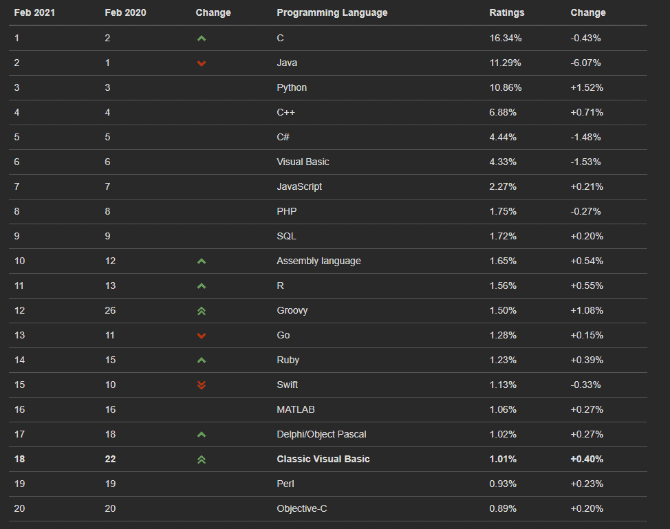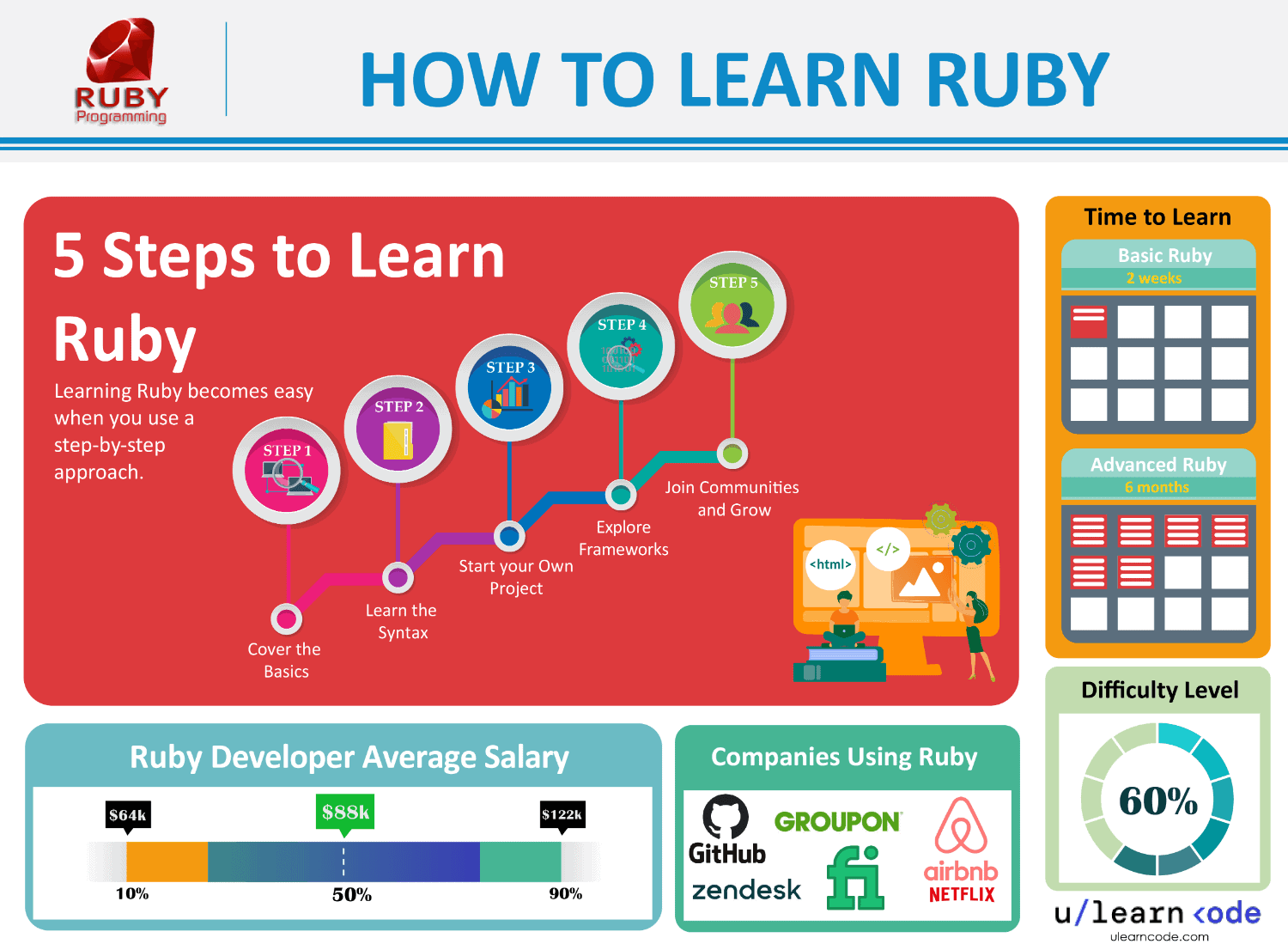Contents
According to the Tiobe Index, Ruby is the 14th most popular programming language, yet there is a huge shortage of developers in the market. Evidently, some developers see it as boring, and they are not inclined to invest their time learning it.
Ruby has some shortcomings, but still, it is a reliable language that is used for multiple purposes. It is currently being used in different industries such as:
- Business
- Arts
- Shopping
- Internet

A big reason for Ruby to be popular is its Ruby on Rails framework: a complete development tool for website applications. Rails are still relevant and being used by various web developers due to their capabilities to simplify various repetitive tasks.
So is it still a worthwhile language to learn? The answer is probably ‘yes’ because it is still widely used in web development, eCommerce sites, database solutions, and prototyping. Here is a definitive guide to help you decide if and how to learn Ruby.
Is Ruby Easy to Learn?
Ruby is a relatively easier programming language to learn. The reason is its simple syntax and clean structure without any clutter. Furthermore, the language is precise and short.
It is also quite effective when it comes to its coding practices. The language structure helps you write code smoothly, but at the same time, it gets a little boring for some developers who are coming from a modern programming background.
As the language itself is precise and to-the-point, its coded programs are also pretty short, which saves developers a ton of time. Moreover, it also makes troubleshooting and debugging processes simpler.
Many developers get stuck with Blocks and Procs, which might get a little trickier, but overall, the language is fairly simple and easy to pick up. If your main aim is web development, you’ll also have to learn Rails, a framework built on top of the Ruby language.
How Long Does it Take to Learn Ruby?
The basic syntax of the programming language is learnable in just a few weeks, but the important thing is to understand and master the concepts, which takes a lot of time and practice. Moreover, it also depends on your prior experience with programming.
Many Ruby concepts vary from other languages; for example, the variables are entirely different from C#. Once you learn Ruby, you then have an option to work on any of its frameworks. Adapting to them and getting used to the environment is a wholly different skill.
If you want to be a web developer, then the Sinatra framework is a good place to a start. It will only take you around 3 weeks to master Sinatra for developing fairly good websites.
On the other hand, the Rails framework is a bit complex for a beginner. It requires more time and effort before a developer is ready to create a fully functional site. On average, it takes around 2 months for new Ruby developers to get their hands set on Rails.
How to Learn Ruby Programming

We’ve already discussed Ruby’s difficulty level and some of its frameworks, but how exactly can one learn it without any issues? Here are five easy steps to follow:
#1: Cover the Basics
Ruby is a straightforward language with clear fundamentals. The basic concepts are easily learnable in a few weeks, but there are a few difficult elements such as Blocks and Procs that might take some extra time.
Learning the basics will allow you to explore the complex side of Ruby, especially if you are going to work with the Rails framework. In order to get ready to work on frameworks, you need to clear some basic things like:
- syntax
- control flow
- loops
To build a solid Ruby foundation, you also need to study hashes and object-oriented programming. You can learn all these things step-by-step by joining any of these outstanding Ruby courses.
#2: Learn the Syntax
The syntax defines the structure for any programming language. Ruby has a fairly simple syntax with different elements that we will discuss in this step.
The foremost thing is to learn data types. After the data types, the next thing is variables, which are very different from other languages. You also have to study the object structure and how Ruby utilizes it. Lastly, there are strings and string methods to master before you start working on a project.
If we summarize everything, then here’s what you need to learn as a beginner:
- Conditional Statements
- Loops
- Arrays and Hashes
- Methods & Blocks
- Object-Oriented Programming
#3: Start Your Own Project
Creating test projects is the best way to master any programming language. It allows us to play with the code in order to achieve the desired output. There are a lot of things that you can develop with Ruby, such as:
- web application
- forum
- simple bot
- web scraper tool
- Ruby poker
You can also come up with your own idea after analyzing the problems that you face. Try to fix that small problem by writing some Ruby code. You can automate a boring task by creating a bot. Keep practicing and try to make something all your own.
#4: Explore Frameworks
Many people are aware of Rails, but there are also many other great Ruby frameworks that developers use, including:
- Sinatra
- Padrino
- Hanami
Sinatra is by far the easiest Ruby framework for web development, and you can pick it up in just 2-3 weeks. On the other hand, Hanami is an excellent option to develop lightweight applications that consume fewer resources.
#5: Join Communities & Grow
Nothing can provide you with more value than a community of people who are all focused on one single thing. Ruby developers have their presence on some popular and less known platforms such as:
You can also utilize resources from GitHub, where many other Ruby developers share their code. Take inspiration from them and develop something new to grow every day.
To Wrap Up
Ruby is still relevant to this date, but many people ignore it because it’s a bit slow in execution. Moreover, people tend to limit Ruby to its Rails framework, but that’s not the case. Ruby is a broad language with a range of frameworks that can be utilized to create excellent applications and websites.